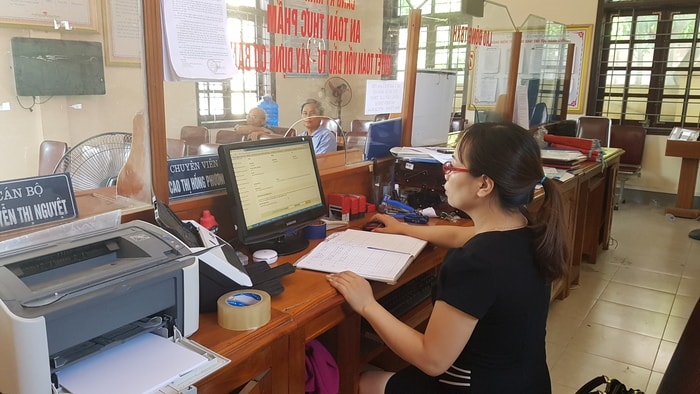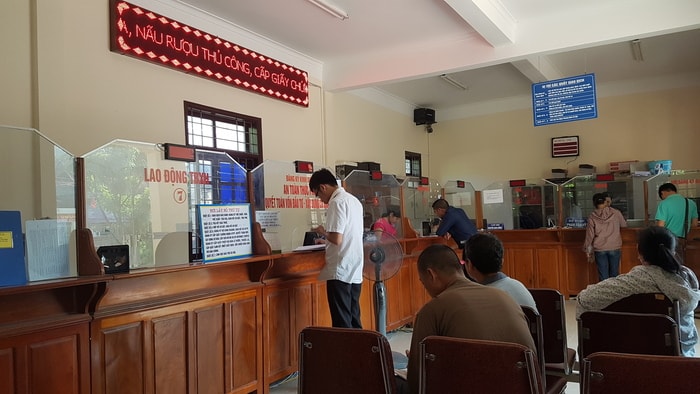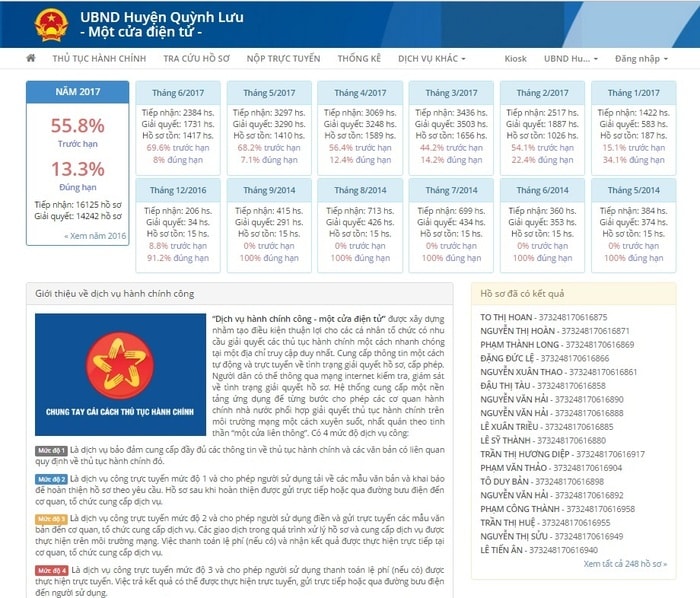Nghe An: 72,681 records from online public services resolved in 5 months
(Baonghean) - After more than 5 months of official implementation in Nghe An, the online public service portal is gradually demonstrating its outstanding advantages, commensurate with the efforts to build a modern public administration. However, agencies, units and localities still need to be more thorough, change the old thinking and working methods of officials and civil servants, along with promoting propaganda so that people know and access online services.
Since January 10, 2017, the online public service portal system and the province's electronic one-stop system have been officially launched, and have initially achieved some encouraging results.
According to the Department of Information and Communications, as of June 8, the system operated stably, ensuring information security. The whole province received more than 90,653 records, processed more than 72,681 records (of which, 55,140 were before the deadline, 7,113 were on time and 10,428 were late), with 1,216 records remaining.
Many provincial departments, branches and sectors, along with 21 districts, cities and towns, have published administrative procedures on the online public service portal, with a total of 5,162 public services, including 4,339 level 2 public services and 810 level 3 public services. In particular, 13 level 4 public services - the highest level - have been deployed at the Department of Justice (7 procedures), the Department of Labor, War Invalids and Social Affairs (4 procedures), the Department of Finance (1 procedure), and the Department of Culture and Sports (1 procedure).
 |
| Staff working on the electronic one-stop shop software at Nghi Loc District People's Committee. Photo: Thu Giang |
Such positive signals are thanks to the proactiveness and readiness of units and localities, efforts to approach, learn and master the system as well as how to operate in a short time, organize training sessions for commune-level officials, and build a set of standard procedures to be able to assign and assign tasks to each official, civil servant, and individual in the apparatus when problems arise.
Among these, the most prominent is the one-stop reception and results center of Nghi Loc district, although not a "key" district of the whole province, but has a drastic and concerned approach in the process of implementing online public services. Up to now, all public services have been listed at the district's own access address, meeting the level 2 standard requirements and are in the process of testing level 3.
Ms. Cao Thi Hong Phuong - a specialized officer of the department receiving and returning results under the one-stop mechanism, said: "Since the province's policy was issued, we have actively advised and been directed by the district leaders to implement it resolutely. Every month, we urge the communes directly by phone when there are signs of delay or negligence, have full statistical reports, specifically name the communes that have done well (such as Nghi Van, Nghi Xuan, Nghi Phong, Nghi Dong, ...) and also do not hesitate to "name" the communes that have not really worked hard and completed the above tasks well (such as Nghi Kieu, Nghi Xa, Nghi Hung, Nghi Hoa, ...) so that they know to overcome.
Thanks to continuous urging, from the initial 13 communes, up to now all 29 communes of Nghi Loc have deployed the synchronous application of the system's features, managing records and documents in a more systematic and orderly manner. Compared to the way some localities do, which is to assign staff from specialized departments to be on duty at the district's one-stop shop, in Nghi Loc there is only 1 staff in charge of receiving records on all working days and in most fields, thanks to which the district saves the allowance to be paid of about 400,000 VND/person/month, while at the same time effectively utilizing and avoiding wasting human resources.
In addition, once it is in order and creates a habit for people, citizens who need to transact with the government will reduce time and travel costs and make transactions. The public posting of the number of local and unit files that have been received and processed, the rate of files processed on time, before the deadline and late is the basis for superior leaders and people to monitor and supervise, and is a parameter to help evaluate the professionalism of public administrative services as well as the capacity and working attitude of officials and civil servants in the apparatus.
 |
| Citizens transact at the one-stop reception and result delivery department of Nghi Loc district. Photo: Thu Giang |
However, through the implementation process, some places admitted that the implementation results were not as expected, with many different causes and manifestations: many software still exist in parallel and have not been integrated with each other, work processing forms have not been updated, there is no connection from district to province but the process has only ended at the district level, digital signatures have not been applied in processing online records and documents, departments and branches have not issued a set of procedures at district and commune levels, there are no sanctions to handle officials and civil servants who are slow or "lazy" in updating records to the system, etc. In many localities and units, including Quynh Luu, the "movement" of commune-level officials is generally not really positive, more or less creating inertia in the process of implementing online public services of the district.
Ms. Nguyen Thi Huong - an officer in charge of the one-stop reception and results delivery department of Quynh Luu district shared: "Apart from some communes that seriously and regularly enter data such as Tan Hai, Tan Son, Quynh Tam, etc., in many other communes, most of the officers still "complain" about the software having many sections, being difficult to see, difficult to operate, or using the excuse of being busy with other things, justifying the low results of implementing the task of deploying online public services.
Recently, through direct channels and at meetings, Quynh Luu has frankly reminded and criticized communes that still have many backlogs in various fields, and suggested assigning specific responsibilities, and that the delay is due to officials or commune leaders in order to have a way to overcome and prevent the risk of recurrence.
In addition, online public services have not really brought into full play their features and effectiveness because most people do not know or know but cannot use this online tool. Analyzing the reasons leading to the above situation, Mr. Le Van Tan - Director of the Provincial Electronic Information Portal pointed out: "Currently, very few applications are submitted online because citizens still have the mentality of preferring to go to the place to transact, the level of education is not high, and the ability to master information technology is limited.
 |
| Interface of online public service portal of Quynh Luu District People's Committee. |
Propaganda work has not received due attention and needs to be strengthened and promoted through various channels so that people understand that the purpose of online public services is to serve the task of administrative reform in general, helping to publicize and make information transparent, reducing travel and communication costs for the people themselves.
The Department of Information and Communications has issued a document requesting units at one-stop transaction departments to post instructions and procedures for submitting documents online, actively encourage people to submit documents on the internet, and design propaganda posters and billboards so that people can learn and master how to use the system.
In the coming time, when Nghe An continues to pilot non-cash payment solutions, including the solution of collecting fees and charges for public administrative services online, people will feel more clearly the convenience in many aspects of conducting online transactions with relevant agencies and units. At the same time, the capacity and working style of "one-stop" officials must be improved and rectified to create a smooth operation mechanism for online public services.
Thu Giang
| RELATED NEWS |
|---|


